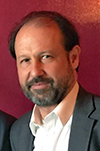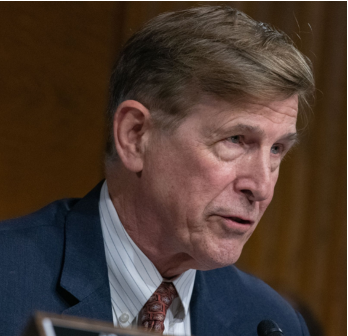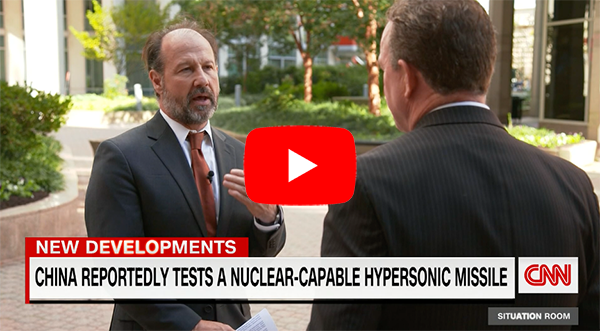Inside the Arms Control Association
October 2021
This week (Oct. 24-29) marks United Nations Disarmament Week, which seeks to promote awareness and a better understanding of disarmament issues. The annual observance was first called for at the UN’s 1978 special session on disarmament.
 Since we were founded 50 years ago, the Arms Control Association has been a leading force pushing, prodding, and promoting effective action on arms control, nonproliferation, and disarmament—every day of every week, every year.
Since we were founded 50 years ago, the Arms Control Association has been a leading force pushing, prodding, and promoting effective action on arms control, nonproliferation, and disarmament—every day of every week, every year.
We’ve made a difference—but nuclear competition and global tensions are growing once again, progress on nuclear disarmament is stalled, key treaties that have kept the peace are under stress. There is much more to be done.
In the coming days and weeks, we’ll be working hard to address the nuclear disarmament deficit on several fronts. The Tenth Nuclear Nonproliferation Treaty Review Conference (NPT RevCon) is now set for Jan. 4 - 28, 2022. At the request of the Kazakh Mission to the UN, I’ll be in New York today participating on a panel with the president-designate of the conference addressing a diplomatic audience regarding “achieving a balanced outcome” in January.
To help stimulate creative thinking about how to jumpstart action on disarmament, ACA will soon publish a new report on a new concept for multilateral nuclear disarmament summits.
Our team is also providing sober and clear analysis about what is motivating China’s nuclear buildup, why no one wins arms races, and why dialogue on nuclear risk reduction and progress on arms control is essential. Next month, ACA will host a virtual press and public briefing on China’s nuclear buildup, options for arms control, and implications for U.S. nuclear policy.
As the vital 2015 Iran nuclear deal hangs in the balance, our nonproliferation policy team led by Kelsey Davenport continues to engage with key officials from the United States, Europe, and Iran. We continue to deliver advice and analysis about why a mutual return to compliance is essential. For the latest, see our reporting and analysis in Arms Control Today and Kelsey’s “Explainer: On Iran’s Nuclear Progress” for the U.S. Institute of Peace.
Our Chemical Weapons Convention Coalition project, led by Dr. Paul Walker and Leanne Quinn, is helping civil society engage at the upcoming conference of CWC states-parties and keeping a spotlight on key issues like the work necessary to destroy the last portion of the U.S. chemical weapons arsenal, and the heated debate over how to hold Russia and Syria accountable for chemical weapons use. For more on our CWC work, see the Coalition’s website.
As the Ploughshares Fund said about us earlier this year: “ACA maintains a strong reputation as a credible and highly connected 'think-and-do' tank in the nuclear policy arena.”
Our work depends on your support. Please help keep us moving forward!
 Daryl G. Kimball,
Daryl G. Kimball,
Executive Director
Virtual Talk with Co-Chair of N-Weapons and Arms Control Working Group Dec. 9
 Arms Control Association members are invited to join a one-hour virtual briefing session with Representative Don Beyer (VA-8) on the work of the new bicameral Nuclear Weapons and Arms Control Working Group.
Arms Control Association members are invited to join a one-hour virtual briefing session with Representative Don Beyer (VA-8) on the work of the new bicameral Nuclear Weapons and Arms Control Working Group.
Mr. Beyer, who represents Virginia’s 8th district, along with senior ACA staff will provide an update on the working group and its efforts to encourage U.S.-Russian nuclear arms reduction talks and to build support for action by the Biden administration to reduce the role and number of nuclear weapons through its Nuclear Posture Review.
The briefing will be held from 7:00-8:00 p.m. ET Thursday, Dec. 9. If you are currently an ACA member, we will shortly send you an invitation to RSVP.
ACA members will have a chance to ask questions of Representative Beyer and hear more from our policy team about our work on Capitol Hill.
Zia Mian, ACA Board Member Elected APS Fellow
Congratulations to ACA board of directors member, physicist Zia Mian who has been elected a Fellow of the American Physical Society for “promoting global nuclear risk reduction and disarmament through academic research, public speaking, technical and popular writing and organizing efforts.”
Zia, who serves as co-director of Princeton’s Program on Science and Global Security, also received the 2019 Leo Szilard Lectureship Award. In the tradition of Szilard’s effort to ensure that science is harnessed for the social good, he recently co-founded the Physicists Coalition for Nuclear Threat Reduction. See his jointly written article, “Once More into the Breach: Physicists Mobilize Again to Counter the Nuclear Threat,” in the May 2021 issue of Arms Control Today.
IN MEMORIAM: Philip E. Coyle III (1934–2021)
The Arms Control Association family mourns the death of scientist and board of directors member Philip Coyle. During his career, Phil worked at Lawrence Livermore National Laboratory, and in various government positions. Notably, he was director of operational test and evaluation at the Pentagon, where he evaluated the testing programs of major military systems, applying sharp technical analysis, particularly to national missile defense plans. Outside of government, he continued to play an invaluable role in the arms control community, evaluating and explaining technical aspects of weapons systems like missile defense with unrivaled expertise.
We will miss not only his analytical acumen but also his kindness and warmth. For more on Phil Coyle, please see the “In Memoriam” written by Lisbeth Gronlund in the October issue of Arms Control Today.
In Case You Missed It…
- ACA Board member Andrew Weber and research associate Shannon Bugos were cited in TIME Magazine’s Oct. 20 report about China’s latest hypersonic missile test. Bugos said, “The test highlights the importance of opening a dialogue with Beijing on matters related to strategic stability that is aimed at reducing the risk of conflict and escalation…”
- Director for nonproliferation policy Kelsey Davenport was quoted in The Christian Science Monitor’s story about the Iran nuclear deal talks Oct. 15, explaining: “The bottom line is that restoring the deal serves the best interests of both Iran and the United States.”
- Executive director Daryl Kimball told CNN Oct. 6 that the Biden administration’s decision to reveal the total number of U.S. nuclear weapons is a positive step that could put pressure on Russia and China to be more transparent about their stockpiles.
- Bugos spoke on the Ploughshares Fund’s “Press the Button” podcast Oct. 5 about the findings in ACA’s new report The Allure and Risks of Hypersonic Weapons.
- Bugos was quoted by The Washington Post’s Sept. 29 story on North Korea’s test of a hypersonic missile, noting that “hypersonic weapons aren’t necessarily a military revolution, but rather an evolutionary development that will not fundamentally change the nature of conflict.”
- In The Associated Press' Sept. 28 report, “Nukes Not in Forefront in Speeches at UN,” Kimball said the danger posed by nuclear weapons “is a forgotten and neglected danger, but it is forever present. It deserves to be at the top of the agenda, and it really should demand more attention.”
- The Chemical Weapons Convention Coalition hosted a webinar Sept. 23 on the status of U.S. chemical weapons stockpile elimination efforts with Dr. Brandi Vann, Deputy Assistant Secretary of Defense for Chemical and Biological Defense, and Irene Kornelly, Chair of the Colorado Citizens' Advisory Commission.

